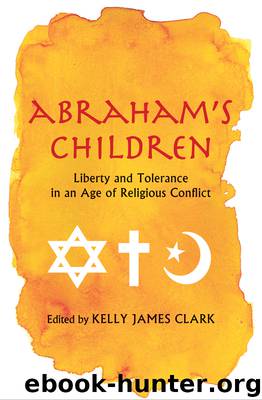Abraham's Children by Kelly James Clark

Author:Kelly James Clark
Language: eng
Format: epub
Publisher: Yale University Press
I lived in misery like every man whose soul is tethered by the love of things that cannot last and then is agonized to lose them.… The grief I felt for the loss of my friend had struck so easily into my inmost heart simply because I had poured out my soul upon him, like water upon sand, loving a man who was mortal as though he were never to die. (Confessions IV, 6, 8)
The cure is to detach one’s love from such objects and attach it to something immutable and indestructible. For Augustine, the only candidate was God. “Blessed are those who love you, O God. No one can lose you … unless he forsakes you” (Confessions IV, 9).
Augustine should not be interpreted as opposed to all enjoyment of earthly things: of food, of drink, of conversation, of visible beauty, of music. Suspicious and wary, yes; opposed, no. His point in the Confessions is only that we should root out all love for things whose death or destruction would cause us grief. To enjoy the taste of kiwi fruit is acceptable provided one’s enjoyment is not such that should kiwi fruit prove unavailable one grieves. Though we must not love the world, we may enjoy it. Yet it must be admitted that Augustine says little or nothing by way of grounding the legitimacy of such enjoyment. In the famous passage in Book X of the Confessions where the things of creation speak, what they say is not “Receive us with enjoyment as God’s blessing” but “Turn away from us to our maker.” Further, Augustine was fond of saying that things of this world are to be used (uti) whereas God and God alone is to be enjoyed (frui).
Augustine held that the struggle to eliminate one’s love for earthly things is never complete in this life; the newly oriented self never wholly wins out over the old. That introduces a new mode of grief into our lives—this a legitimate mode. We are to grieve over the repetitious reappearance of the old self—and correspondingly, to rejoice over the extent of its disappearance. And also—most extraordinary—we are to grieve over the sins of others and to rejoice over their repentance. Each of us is to be joined in a solidarity of rejoicing and grieving with all humanity—rejoicing and grieving over the right things, however, namely, over the religious condition of our souls.5 I am to rejoice and grieve over the religious condition of my soul and, in the very same way, over the religious condition of your soul. This exception is important. Yet the general rule is that we are to struggle to eliminate grief from our lives by struggling to concentrate our love on God alone.
All this has been about us human beings. What Augustine says about God is the more or less obvious counterpart. God’s life is through and through blissful. In God there is no emotional disturbance. Of sympathy, Mitleiden, with those who are suffering, God feels nothing, as also God feels no pain over the shortfall of godliness in God’s errant creatures.
Download
This site does not store any files on its server. We only index and link to content provided by other sites. Please contact the content providers to delete copyright contents if any and email us, we'll remove relevant links or contents immediately.
The Gnostic Gospels by Pagels Elaine(2532)
Jesus by Paul Johnson(2363)
Devil, The by Almond Philip C(2333)
The Nativity by Geza Vermes(2233)
The Psychedelic Gospels: The Secret History of Hallucinogens in Christianity by Jerry B. Brown(2158)
Forensics by Val McDermid(2094)
Going Clear: Scientology, Hollywood, and the Prison of Belief by Lawrence Wright(1985)
Going Clear by Lawrence Wright(1968)
Barking to the Choir by Gregory Boyle(1822)
Old Testament History by John H. Sailhamer(1818)
Augustine: Conversions to Confessions by Robin Lane Fox(1774)
The Early Centuries - Byzantium 01 by John Julius Norwich(1746)
A History of the Franks by Gregory of Tours(1729)
A Prophet with Honor by William C. Martin(1728)
Dark Mysteries of the Vatican by H. Paul Jeffers(1723)
The Bible Doesn't Say That by Dr. Joel M. Hoffman(1682)
by Christianity & Islam(1636)
The First Crusade by Thomas Asbridge(1611)
The Amish by Steven M. Nolt(1575)
